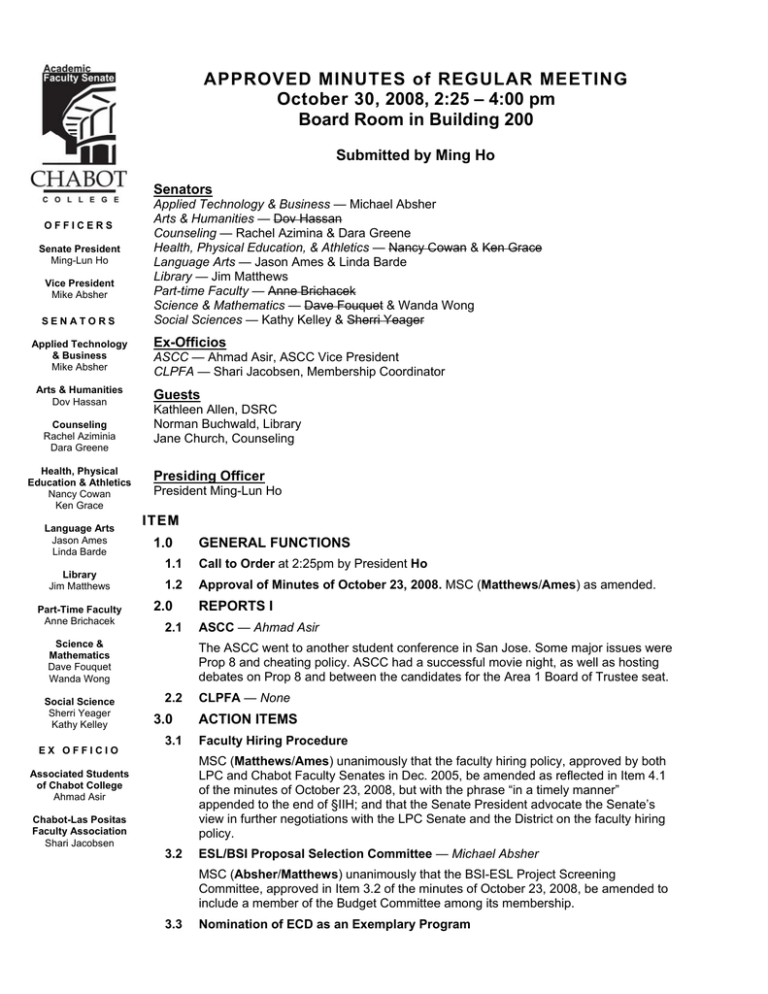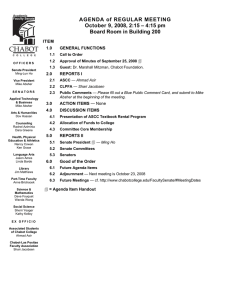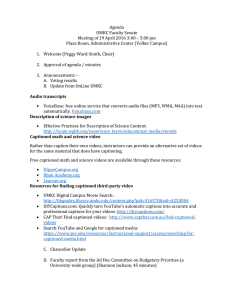APPROVED MINUTES of REGULAR MEETING Board Room in Building 200
advertisement

APPROVED MINUTES of REGULAR MEETING October 30, 2008, 2:25 – 4:00 pm Board Room in Building 200 Submitted by Ming Ho Senators OFFICERS Senate President Ming-Lun Ho Vice President Mike Absher SENATORS Applied Technology & Business Mike Absher Arts & Humanities Dov Hassan Counseling Rachel Aziminia Dara Greene Health, Physical Education & Athletics Nancy Cowan Ken Grace Language Arts Jason Ames Linda Barde Library Jim Matthews Part-Time Faculty Anne Brichacek Applied Technology & Business — Michael Absher Arts & Humanities — Dov Hassan Counseling — Rachel Azimina & Dara Greene Health, Physical Education, & Athletics — Nancy Cowan & Ken Grace Language Arts — Jason Ames & Linda Barde Library — Jim Matthews Part-time Faculty — Anne Brichacek Science & Mathematics — Dave Fouquet & Wanda Wong Social Sciences — Kathy Kelley & Sherri Yeager Ex-Officios ASCC — Ahmad Asir, ASCC Vice President CLPFA — Shari Jacobsen, Membership Coordinator Guests Kathleen Allen, DSRC Norman Buchwald, Library Jane Church, Counseling Presiding Officer President Ming-Lun Ho ITEM 1.0 1.1 Call to Order at 2:25pm by President Ho 1.2 Approval of Minutes of October 23, 2008. MSC (Matthews/Ames) as amended. 2.0 2.1 Science & Mathematics Dave Fouquet Wanda Wong Social Science Sherri Yeager Kathy Kelley EX OFFICIO GENERAL FUNCTIONS REPORTS I ASCC — Ahmad Asir The ASCC went to another student conference in San Jose. Some major issues were Prop 8 and cheating policy. ASCC had a successful movie night, as well as hosting debates on Prop 8 and between the candidates for the Area 1 Board of Trustee seat. 2.2 3.0 3.1 CLPFA — None ACTION ITEMS Faculty Hiring Procedure MSC (Matthews/Ames) unanimously that the faculty hiring policy, approved by both LPC and Chabot Faculty Senates in Dec. 2005, be amended as reflected in Item 4.1 of the minutes of October 23, 2008, but with the phrase “in a timely manner” appended to the end of §IIH; and that the Senate President advocate the Senate’s view in further negotiations with the LPC Senate and the District on the faculty hiring policy. Associated Students of Chabot College Ahmad Asir Chabot-Las Positas Faculty Association Shari Jacobsen 3.2 ESL/BSI Proposal Selection Committee — Michael Absher MSC (Absher/Matthews) unanimously that the BSI-ESL Project Screening Committee, approved in Item 3.2 of the minutes of October 23, 2008, be amended to include a member of the Budget Committee among its membership. 3.3 Nomination of ECD as an Exemplary Program Chabot Academic Faculty/Senate Approved Minutes of October 30, 2008 MSC (Absher/Matthews) unanimously that this action item be added to the agenda due to the fast-approaching application deadline of Nov. 14. MSC (Kelley/Absher) that Early Childhood Development’s faculty development program be nominated for Exemplary Program Award sponsored by the California Community College Board of Governors. 4.0 4.1 DISCUSSION ITEMS ASCCC Resolution on Advanced Placement — Jane Church Jane Church presented the work being done at the CCC system level with regard to granting GE units for Advanced Placement Examinations passed. The ASCCC had a resolution to examine the issue, and there is a proposed list to be adopted systemwide in the community colleges. The proposed list is based on the system-wide lists currently in effect at UC and CSU systems. It lists the proposed number and area of GE units to be granted for each AP Exam. Senator Wong asked why no units are granted for the AP Computer Science Examines. Church responded that it is because UC and CSU do not do so, and the CCC list is based on their lists. However, it does not mean that we cannot suggest to add computer science to our CCC list. Church stressed that the proposed CCC AP list only addresses GE units. Each discipline at an individual college establishes its own course equivalency based on the AP Exams. It is recommended that the disciplines examine course equivalency carefully so that students will not have to repeat courses unnecessarily. 4.2 Closed Captioning of Library Material — Kathleen Allen & Norman Buchwald The CCC System Chancellor’s Office had issued a legal advisory that, in order to accommodate the hearing impaired, all videos/DVDs must be closed-captioned for instructional and library use. In following the advisory, the Chabot Library instituted strict policy to order only closed-captioned materials. In a handout, attached at the end of the minutes, Kathleen Allen and Norman Buchwald explain why the strict policy do not serve the students well and propose a new policy that would still respect the letter of the American with Disabilities Act. The Library and DSPS would like to allow the purchase of videos/DVDs without closed-captions only at an instructor’s request and set up a process to closed-caption such materials to meet the needs of the hearing impaired. The text of their proposed policy is included at the end of the minutes. Senator Kelley asked that, if a video is for enrichment as opposed to required assignment, does it still need to be closed-captioned? The answer is, Yes. Questions were raised about a superminority preventing others from accessing enrichment material and about the law being too limiting, and the response was that an effort must be made not to exclude certain class of people. Senator Absher noted that the laws says that videos shall be closed-captioned whether or not there are hard of hearing students in class. The proposed policy, however, allow some latitude as long as faculty makes a genuine attempt to comply with the law and the spirit of the law is followed. Allen commented that a good thing that came from the legal advisory is that it has made people more vigilant about meeting the needs of students with disability, although she concedes that it does present problems. In helping to satisfy the needs of closed-captioning, the DSRC consults state- and nation-wide databases of material already closed captioned to facilitate the acquisition of needed material. Arrangements are often made so that an instructor’s original copy of a video does not get stuck in a queue while waiting to be closed-captioned. 5.0 5.1 REPORTS II Senate President — Ming Ho. Senate Appointments District Budget Study Group: Mike Absher, Rachel Aziminia District Curriculum Committee: Mike Absher, Wayne Pitcher, Kathy Kelly (Spring 09 to replace Wayne Pitcher as he assumes Curriculum Chair) 5.2 Senate Committees 2 Chabot Academic Faculty/Senate Approved Minutes of October 30, 2008 5.3 Senators Senator Absher reported that the District Budget Study Group is starting again. This committee examines district financial issues and creates a fiduciary philosophy under which the district operates, including the use of the allocation model. 6.0 Good of the Order 6.1 Future Agenda Items 6.2 Adjournment at 4pm. Next meeting is November 13, 2008 6.3 Future Meetings — cf. http://www.chabotcollege.edu/FacultySenate/#MeetingDates = Agenda Item Handout Handouts for Item 4.2 Towards a New Chabot College Library Policy on Ordering New Videos and DVD’s For equal access to education, the Chancellor’s office has mandated that all videos and DVD’s that are used for instruction, classroom use, and library use must be closed captioned, based on the decision written by Ralph Black, the Chancellor’s Office attorney:(for text of the interpretation, go to: http://www.htctu.fhda.edu/divisions/altmedia/captioning/cc/LO_M_0222.pdf). Since this decision was handed down, California community colleges across the state have struggled with trying to find and guarantee closed captioned materials to students. At Chabot College, we have done our best, but always at a challenge with the staffing and proper funding to caption materials, and the challenge of finding educational materials that are already closed captioned. Educational and non-profit institutions that provide the main bulk of documentaries and other educational materials most often cannot afford to close caption materials on their own. The Department of Education has also had budgeting challenges that can never meet the need to close caption necessary materials. While the United States Congress often has a bill put forth most every year titled the “Real Time Closed Captioning Act,” the bill has as of yet not succeeded in passing both Houses of Congress or has been guaranteed a signature by the President to be signed into law. When Black’s decision was handed down, Chabot College Library instituted two policies: One, that we would no longer order materials that are NOT closed captioned. Two: that we would replace titles we have in our collection with closed captioning ones, when they are available. Neither of these policies support providing students the true breadth of educational resources in the audio visual format. Most of our non-closed captioned titles do not have replacements, even in areas of like subjects, such as vocational training videos in the areas of fire science, dental hygiene, and nursing, or poetry readings or important non-profit or independently made documentaries. Many requests our teaching faculty make are also not closed captioned, so the Library ends up denying teaching faculty the audio visual format to use for their instruction. Current policies are getting in the way of educating ALL of our students (disabled and non-disabled), and deny all students in certain disciplines almost 100% of materials outright. Instructors are denied their academic freedom in their teaching and all of our students are denied educational resources they would’ve received because the items are not closed captioned. The Library is asking along with DSPS a change in our current policies that would still respect the letter of the law of the American with Disabilities Act, and similar legislation. Here is what we’re asking: New Library Policy on Ordering Video and DVD Materials That Are Not Closed Captioned 1. While the instructor should be encouraged to find a similar title that is already closed captioned, the Library will no longer deny the instructor’s request. A DVD that has subtitles would be considered a closed captioned video. 3 Chabot Academic Faculty/Senate Approved Minutes of October 30, 2008 2. The Library will continue as it has to request permission for closed-captioning by the company when ordering the video or DVD. 3. Requests for audiovisual materials should be made at least a semester in advance, to at least allow turn around time for the video or DVD to be closed-captioned. If the item is requested in less time, exceptions can be made and then followed as below, with the item slated to be actually closed-captioned after the end of that current semester. Exceptions would be rare, however, and would not be repeatedly given to the same instructor. 4. When the Library receives the video or DVD, we would process it, catalog it, and put in the catalog, the note, “To Be Closed Captioned.” 5. The item will then be sent to the alternate media technology specialist for closed captioning in Building 2400, with a fairly speedy turn around time. 6. If the requests for closed captioning pile up, and the video or DVD cannot be closed captioned in time for the next semester (or an exception was made for an “emergency request”), the video or DVD will be in the catalog with the message “To Be Closed-Captioned.” Instructors should still not assign the video or DVD to students in a class where at least one of the students is hearing impaired. Such videos (requested by instructors) would have priority to be close-captioned. Videos labeled “To Be Closed-Captioned” that especially demonstrate a lot of check out activity will especially move up to the first of the list. 7. If funding does not come in to closed caption materials, we continue to order and process videos and DVDs and label them in the Library Catalog “To Be Closed-Captioned.” Videos and DVDs would still be Reserve only for checkout for a particular course. 8. Outside of instructor’s requests, the Library would still not order videos or DVDs, unless they are closed-captioned. 9. If the video or DVD is predominantly a music video with hardly any discussion or dialogue (such as an orchestra performing a piece), that material would be exempt from closedcaptioning and be so marked in the catalog. Exceptions to above can be made in these instances: 1. If videos/DVDs are scarce such as vocational training videos—then the librarian and instructors of that department should work together in selecting key videos or DVDs. 2. For repeat research assignments, where the video/DVD would be valuable and there’s no alternative-- Librarians can notify instructors if a particular title would be good for their particular assignments and then if agreed, order, and after received be labeled as “to be closed captioned.” What to do with the current collection— 1. All items not closed captioned that are still worthy should also be labeled “To Be ClosedCaptioned” 2. Videos of this distinction will be given in batches to DSPS, but do not have priority as instructor requested titles. 4

